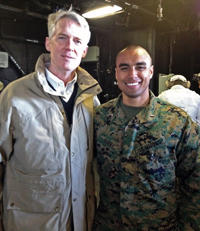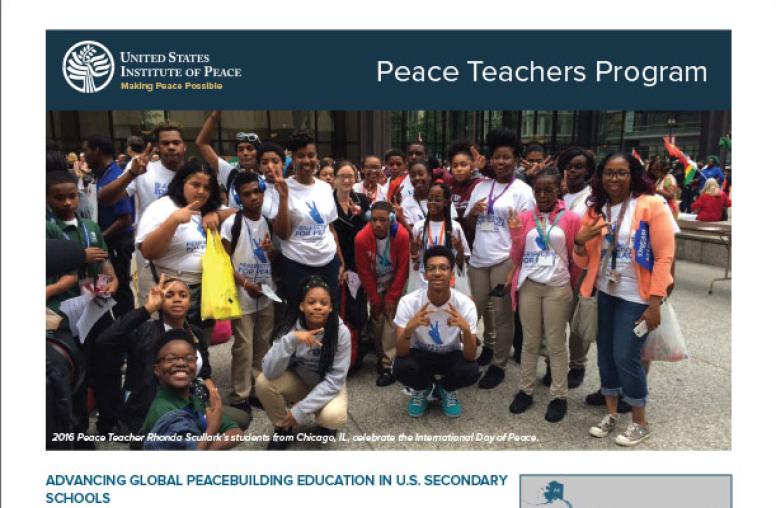Virginia: At the Crossroads of Building Peace
The Commonwealth of Virginia continues to expand as a center of innovation for peacebuilding activities to strengthen the capabilities of the U.S. military and civilian corps to work together around the world. Across Virginia, from the Pentagon to the peacebuilding academies, from workshops at universities to grants to practitioners, USIP is working closely to build partnerships.

The Commonwealth of Virginia continues to expand as a center of innovation for peacebuilding activities to strengthen the capabilities of the U.S. military and civilian corps to work together around the world.
Across the Commonwealth of Virginia, from the Pentagon to the peacebuilding academies, from workshops at universities to grants to practitioners, USIP is working closely to build partnerships.
Off the coast of Virginia, recently, conflict management and peacebuilding experts from the U.S. Institute of Peace participated in the Navy and Marine Corps’ biggest amphibious exercise in a decade, Bold Alligator, as part of USIP’s expansion of civilian-military cooperation and training. The exercise in early February showed how the capabilities of the Marine Expeditionary Brigade and the Navy’s Expeditionary Strike Force are integrated. USIP Chief of Staff Paul Hughes, a retired Army colonel, led a USIP team that observed the exercise. He was joined by senior trainer Nadia Gerspacher, who works extensively with the military. Gerspacher runs the USIP component of the Defense Department’s Ministry of Defense Advisers (MoDA) program, which joins American institutional experts with counterparts in Afghanistan’s ministries to help them become better partners.
 |
| Col. Paul Hughes, USIP chief of staff (left) with First Lieutenant Lucas J. Burke, USMC, a participant of the the Bold Alligator exercise. |
Working with the Pentagon, USIP develops curriculum for the MoDA training program, which provides Department of Defense (DoD) civilian experts with tools and approaches for effective mentoring and capacity building. The Defense Department considers MoDA training one of the most comprehensive and effective pre-deployment training programs for senior advisers headed to work within Afghanistan's Ministries of Defense and Interior. MoDA is just one of many interactions USIP has with the Pentagon on civilian-military workshops, trainings, course development, gender in the military programs, etc. Each year USIP welcomes an Army officer as part of its fellowship program, and beginning this year will expand to include a Navy fellow.
George Mason University in Fairfax, Virginia, is a principal USIP partner in delivering “SENSE” (Strategic Economic Needs and Security) training – a comprehensive, computer-supported peacebuilding simulation. Since 2009, in partnership with with the Office of the Secretary of Defense, USIP has conducted several interagency SENSE tranings for some 400 whole-of-government participants. Working with other partners, USIP has used SENSE to train thousands of Americans, Iraqis, Afghans, Tunisians, Bosnians, Kosovars, and citizens from a wide range of ex-Communist countries in the basics of building peace and stability. This spring at GMU’s Arlington campus, USIP will begin using the newest version of SENSE – designed to deal with an even wider array of challenges to peace. (SENSE was developed by the Institute for Defense Analyses, in Alexandria, Virginia.)
This new iteration of SENSE -- which USIP plans to debut this year -- will be used to train U.S. government officials involved in peace and stability operations. USIP is currently conducting interagency simulations in the Washington, DC, area using the existing SENSE model. Indeed, George Mason University is often an active partner with USIP through grants, workshops, panel discussions and Track II negotiating initiatives.
In another sphere of activity, gender and peacebuilding, USIP is working with the Naval Warfare Development Command in Norfolk, Virginia, to strengthen technical, civil, and military institutional capacities to mainstream gender and women’s issues in training for peace support operations. The U.S. Institute of Peace has hosted two meetings in collaboration with the Naval Warfare Development Command and the director of USIP’s gender program, Kathleen Kuehnast.
Many Virginia-based institutions partner with USIP. The Judge Advocates General’s School ( JAG) school is one USIP has worked with over the years. Senior Rule of Law Program Officer Vivienne O'Connor, Rule of Law Program Officer Christina Murtaugh, and Colette Rausch, Director of the Rule of Law Center, also travel to Virginia every year to lecture at the law schools at the College of William and Mary and at the University of Virginia. Further, William and Mary's law school is one of USIP’s partners in INPROL—the International Network to Promote the Rule of Law, which USIP and its partners created in 2007 to integrate international expertise around legal issues and conflict.
The Virginia Military Institute (VMI) continues to host USIP speakers such as Daniel Brumberg on the Middle East and Raymond Gilpin who just participated in a conference on China in Africa and will be writing a chapter in a book based on the event, “The Dragon and the Eagle.” USIP also has worked closely with Virginia Tech to develop a center of education and training on conflict management. USIP’s Nina Sughrue recently returned from a week of classes at Eastern Mennonite University in Harrisonburg, Virginia. She studied trauma in conflict. James Madison University’s Nelson Institute for International and Public Affairs has collaborated with USIP on peacebuilding issues, workshops, and publications, as has their Mine Action Information Center.
Many Virginia institutions have also been the recipients of USIP grants. Pursuant to Congress’s mandate that USIP devote a portion of its annual budget to grantmaking, USIP has made more than 80 conflict resolution and peacebuilding-related grants totaling some $3.5 million to universities and nongovernmental organizations in Virginia in recent years. The Institute has funded pathbreaking research, training, and education programs at institutions of higher learning across the commonwealth, including the University of Richmond, Virginia Commonwealth University, Eastern Mennonite University, Old Dominion University, George Mason University, the College of William and Mary, and Randolph-Macon College. USIP looks forward to a continued partnership with the peacebuilding Commonwealth of Virginia.
Explore Further
- Vermont: A Model Peacebuilding State
News Feature



